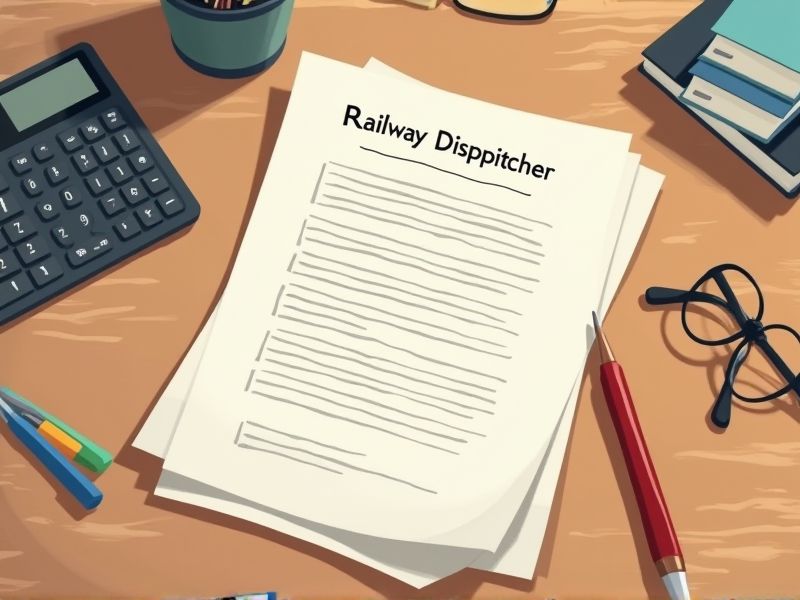
Railway Dispatchers play a critical role in ensuring the safe and efficient movement of trains, necessitating a deep understanding of both safety protocols and communication systems. Certification provides official recognition of an individual's ability to manage these responsibilities under pressure. Regulatory authorities often mandate certifications to maintain industry standards and prevent accidents. It's important for Railway Dispatchers to have specific certifications to ensure competence and compliance.
Federal Railroad Administration (FRA) Dispatcher Certification
The FRA Dispatcher Certification is necessary to ensure railway dispatchers possess the standardized skills and knowledge required to manage train operations effectively, minimizing risks of human error. This certification helps promote safety by enforcing a uniform set of guidelines for operations across various dispatch centers. Structured training and testing improve dispatchers' ability to respond to emergency situations, reducing potential accidents and service disruptions. A formal certification boosts dispatcher credibility and accountability, fostering trust within the industry and among the public.
Rail Safety and Operations Certification
Rail Safety and Operations Certification is required for railway dispatchers to ensure they understand and adhere to critical safety protocols to prevent accidents. It enables dispatchers to effectively manage and coordinate train movements, reducing the likelihood of collisions and scheduling conflicts. Certification provides dispatchers with the necessary skills to handle emergency situations promptly and efficiently, minimizing potential damage and casualties. It assures regulators and the public of a standardized level of competency, fostering trust in railroad operations.
Positive Train Control (PTC) Certification
Positive Train Control (PTC) Certification ensures that railway dispatchers are proficient in operating advanced safety systems designed to prevent train accidents. Certification confirms that dispatchers can effectively manage the PTC technology, which plays a crucial role in maintaining safe railroad operations by automatically controlling train movements. By achieving certification, dispatchers demonstrate their ability to adhere to federal regulatory standards, ensuring the safety of passengers and cargo. The certification reduces human error risks and enhances the overall efficiency and reliability of the railway network.
Dispatcher Communication Proficiency Certification
The Dispatcher Communication Proficiency Certification is essential because it ensures railway dispatchers possess standardized communication skills critical for safety. Effective communication minimizes misunderstandings, directly reducing the probability of accidents and delays in train operations. Trained dispatchers improve operational efficiency by responding accurately and efficiently to real-time incidents. Certification aligns with regulatory requirements and industry best practices, reinforcing accountability and reliability within the railway network.
Railroad Traffic Control Systems Certification
Railroad Traffic Control Systems Certification ensures that railway dispatchers understand the complex systems they manage, minimizing the risk of errors that could lead to accidents. Certification provides dispatchers with knowledge about the latest technologies and operational protocols, improving efficiency and safety in train handling. Regulatory bodies require such certification to maintain standardized safety practices across the industry. This certification reassures the public and stakeholders that rail services are operated by qualified professionals, fostering trust in the railway infrastructure.
Emergency Response and Crisis Management Certification
A certification in Emergency Response and Crisis Management equips railway dispatchers with crucial skills to handle unexpected incidents efficiently. By understanding crisis protocols, dispatchers can minimize the risks and potential damages during railway emergencies. Formal training in these areas fosters a standardized response, ensuring that dispatchers can seamlessly coordinate with other safety agencies. This certification ultimately enhances public trust and ensures a higher standard of safety within the railway system.
Incident Command System (ICS) Certification
The railway dispatcher's role involves critical decision-making during emergencies, where ICS certification provides structured response strategies. ICS-trained dispatchers effectively communicate and collaborate with multiple agencies, enhancing coordination during incidents. Certification ensures dispatchers understand resource management, crucial for maintaining rail service continuity and safety. Regulatory mandates often require ICS training, as it aligns with national incident management standards.
Transportation Management Professional (TMP) Certification
The TMP Certification ensures railway dispatchers have the necessary skills for safety-critical tasks, reducing accidents and improving service reliability. With this credential, dispatchers gain advanced knowledge on managing complex rail networks efficiently, which can minimize operational delays. Certified dispatchers can enhance communication protocols, leading to better coordination between train operators and maintenance crews. This certification can improve career prospects by demonstrating a commitment to industry standards and professional development.
Dispatch Operations Management Certification
Certification in Dispatch Operations Management equips railway dispatchers with advanced operational skills, leading to improved efficiency in train scheduling and coordination. Comprehensive training ensures dispatchers adhere to safety protocols, reducing the likelihood of accidents. Certified dispatchers gain expertise in real-time decision-making, crucial for managing unexpected disruptions. Formal certification signals commitment to professional development, enhancing career prospects within the industry.
Signal and Control Systems Training Certification
Railway dispatchers require Signal and Control Systems Training Certification to ensure they can safely and efficiently manage train operations by understanding complex signaling technologies. This certification equips dispatchers with the skills to interpret and respond to various signal conditions, reducing the risk of human error. As rail network systems become increasingly sophisticated, certified training ensures dispatchers can adapt to and operate advanced control systems. With stringent industry regulations, having this certification demonstrates compliance and enhances the safety of railway operations.
Summary
When you obtain certifications as a railway dispatcher, you increase your marketability and job opportunities within the rail industry. This enhanced qualification leads to improved operational efficiency and safety standards across train networks. Consequently, employers may regard you as an asset, potentially resulting in career advancement and higher earning potential. Industry recognition of your specialized skills also fosters professional confidence and credibility.
